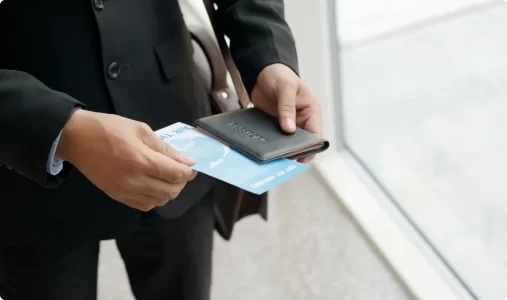Are you having trouble finding what you’re looking for?
Please reach out to our customer service department.
The European Travel Information and Authorisation (ETIAS) system is coming into force in 2025 and, once it is operational, all citizens Travelling to Greece from UK will require ETIAS approval before entering the EU Schengen zone.

Get notified when ETIAS is mandatory

Start the application with us

Receive ETIAS confirmation

Welcome to Europe
When imagining our holiday in Greece we think of hillside towns, gleaming white and blue in the sunshine with tiny windmills spinning on the horizon. We think of towering Athenian architecture or plates of fresh seafood and Greek salad overlooking the glinting Mediterranean Sea. We want nothing more than to welcome you to Greece, but before you come, please take note of some important travel information.
When travelling to Greece from UK, either an approved Schengen visa or Greece ETIAS permission will be necessary, depending on the country you are from. ETIAS Greece will be available to citizens of any non-EU country that has a visa exemption agreement with the EU in order to enter the Schengen zone, such as the UK. Citizens of the UK who desire to go to Greece or any other Schengen country must first obtain ETIAS authorisation.
Passengers no longer need to fill out a Passenger Locator Form (EU PLF) to enter Greece, and if you can verify you are completely vaccinated, you will not have to self-isolate when you get there. In order to enter Greece on transportation by land, air or sea, all passengers must wear a protective mask.

When the ETIAS system if fully operational in 2025, all nationals travelling to Greece from UK will be required to have ETIAS in order to enter Greece and the rest of the Schengen area. The Greece ETIAS application will be a simple process requiring only a valid biometric passport and some basic personal information.
ETIAS for Greece will be valid for three years after the application is approved, or until the registered passport expires, whichever comes first. If the passport is the first to expire, a new Greece ETIAS application must be submitted and approved before re-entering the Schengen zone.
The application will be subject to a modest charge, which has yet to be determined but is expected to be in the region of £6, which must be paid with debit or credit card. Please ensure the card used is fully functional and has sufficient funds, otherwise the application may automatically be rejected. In most cases, applications are approved in a matter of minutes.

Are you having trouble finding what you’re looking for?
Please reach out to our customer service department.
If you are a citizen of a non-EU nation that has a visa exemption agreement with the EU, such as the UK, you will need ETIAS to travel to Greece. When travelling to Greece from UK you must apply for ETIAS Greece. The electronic ETIAS application will be available starting in 2025 (the exact date is not yet confirmed).
There are British embassies, consulates and high commissions throughout Greece, such as the British Embassy Athens, the British Vice Consulate Rhodes, the British Consulate Crete, the British Vice Consulate Corfu, the British Honorary Vice Consulate Zakynthos and the British Consulate in Patras.
It is mandatory to wear a protective mask in all indoor spaces in Greece. In certain spaces, such as pharmacies and public transport, you will be required to wear a double mask or a FFP2/N95 mask. All restrictions are under continual review and may be changed with limited notice. If travelling on internal (domestic) flights within Greece, please check with your operator for their specific requirements.
If you develop symptoms of COVID-19 while staying in Greece, you should avoid visiting health facilities and instead contact a doctor remotely. If your test result is positive, you will be required to stay in a quarantine hotel until otherwise advised.
Yes, British citizens can travel to Greece. As a UK citizen, you do not need a visa for short stays up to 90 days within any 180-day period for tourism, family visits, or business purposes. However, due to the ongoing COVID-19 pandemic, entry requirements and restrictions may change frequently. You might need to provide proof of vaccination, a negative COVID-19 test result, or comply with other health and safety measures. Be sure to check the latest information from both the UK and Greek governments before planning your trip to Greece.
UK passport holders do not need a visa for short stays in Greece for up to 90 days within any 180-day period for tourism, family visits, or business purposes. However, for longer stays or other reasons, UK citizens may need to apply for a visa or residence permit, as the UK is no longer part of the EU. It’s important to check the specific requirements for your intended visit to Greece and stay up-to-date on any changes to visa regulations or entry requirements due to the ongoing COVID-19 pandemic.
In general, tap water in Greece is safe to drink, especially in urban areas and larger cities. The water quality is regularly monitored and meets international standards. However, in some smaller towns, rural areas, or islands, the tap water may not be as reliable, and locals might prefer to drink bottled water. When visiting these areas, it is advisable to follow local recommendations and opt for bottled or filtered water if you have any concerns about the water quality. To stay on the safe side, you can always choose to drink bottled water during your trip.
Tipping in Greece is appreciated but not mandatory. It is customary to tip for good service in restaurants, cafes, and bars. A tip of 5-10% of the bill is generally considered appropriate, but feel free to tip more for exceptional service. You can round up the bill or leave the tip in cash on the table. For other services, such as taxis, it is common to round up the fare or leave a small tip, while for hotel staff, a tip of 1-2 euros per bag for porters or a few euros per day for housekeeping is appreciated. Ultimately, tipping is at your discretion and based on your satisfaction with the service provided.
In Greece, the most common way to say “hello” is by using the Greek word “γεια” (pronounced “YAH”). If you want to be more formal or polite, you can say “Γεια σας” (pronounced “YAH sas”), which means “hello” or “hi” in a more respectful tone, suitable for addressing older people, groups, or someone you don’t know well. In the morning, you may also hear “Καλημέρα” (pronounced “kah-lee-MEH-rah”), which means “good morning,” while in the evening, you can use “Καλησπέρα” (pronounced “kah-lee-SPEH-rah”) for “good evening.”